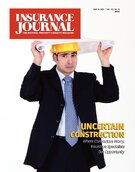Connecticut lawmakers last month moved to plug what could have been a very costly loophole in workers’ compensation benefits that was created by a state Supreme Court decision in March.
The lawmakers effectively invalidated the high court ruling that altered how temporary partial disability benefits are awarded. Insurance industry analysts warned the change initiated by the court could have increased workers’ comp system claim costs by as much as 265% for public and private employers.
In March, the Connecticut Supreme Court overturned legal precedent in Gardner v. Dept. of Mental Health & Addiction Services. The ruling held that workers’ comp administrative law judges have discretion to grant temporary partial disability benefits for up to 520 weeks rather than requiring them to be converted to permanent partial disability benefits after maximum medical improvement.
Lawmakers responded by inserting a provision in a supplementary budget measure. The provision removes an administrative law judge’s discretion to award temporary partial incapacity benefits and eliminates the anticipated cost increases associated with the ruling that would have affected both the state and various self-insured municipalities.
The legislative fix was promptly approved by the Judiciary Committee and inserted into the budget measure (HB 6863) that addressed state budget overruns.
According to a legislative assessment, the savings to the state alone could exceed $4 million per year and may vary significantly from year to year based on the number of cases and the determinations of the administrative law judges.
Rep. Jack Fazzino, D-Meriden, vice chair of the Judiciary Committee, called the effect Gardner could have on the state and municipalities “really very radical.”
Eric George, president of the Insurance Association of Connecticut, told the Connecticut Mirror that municipalities, insurers, businesses, trial lawyers, and labor quickly came to an agreement that something had to be done. “That does not happen often,” George said.
The Gardner ruling reversed both a 2024 judgment of the state appellate court and an earlier workers’ comp board ruling that favored the injured worker’s employer, the state Department of Mental Health, which argued administrative law judges had no such discretion. The Supreme Court justices found the “clear and unambiguous language” of the law (§ 31-308) provides that the administrative law judge “may” but is not required to award permanent partial disability benefits to a claimant after maximum medical improvement is reached.
The court also found that legislative amendments to the workers’ comp law enacted in 1993 did not change the text or meaning of the statute relating to the administrative law judge’s discretion. Neither did the court accept that those amendments altered the situation.
Topics Workers' Compensation Connecticut
Was this article valuable?
Here are more articles you may enjoy.



 ‘Structural Shift’ Occurring in California Surplus Lines
‘Structural Shift’ Occurring in California Surplus Lines  Trump Demands $1 Billion From Harvard as Prolonged Standoff Appears to Deepen
Trump Demands $1 Billion From Harvard as Prolonged Standoff Appears to Deepen  Nine-Month 2025 Results Show P/C Underwriting Gain Skyrocketed
Nine-Month 2025 Results Show P/C Underwriting Gain Skyrocketed  Q4 Global Commercial Insurance Rates Drop 4%, in 6th Quarterly Decline: Marsh
Q4 Global Commercial Insurance Rates Drop 4%, in 6th Quarterly Decline: Marsh 


